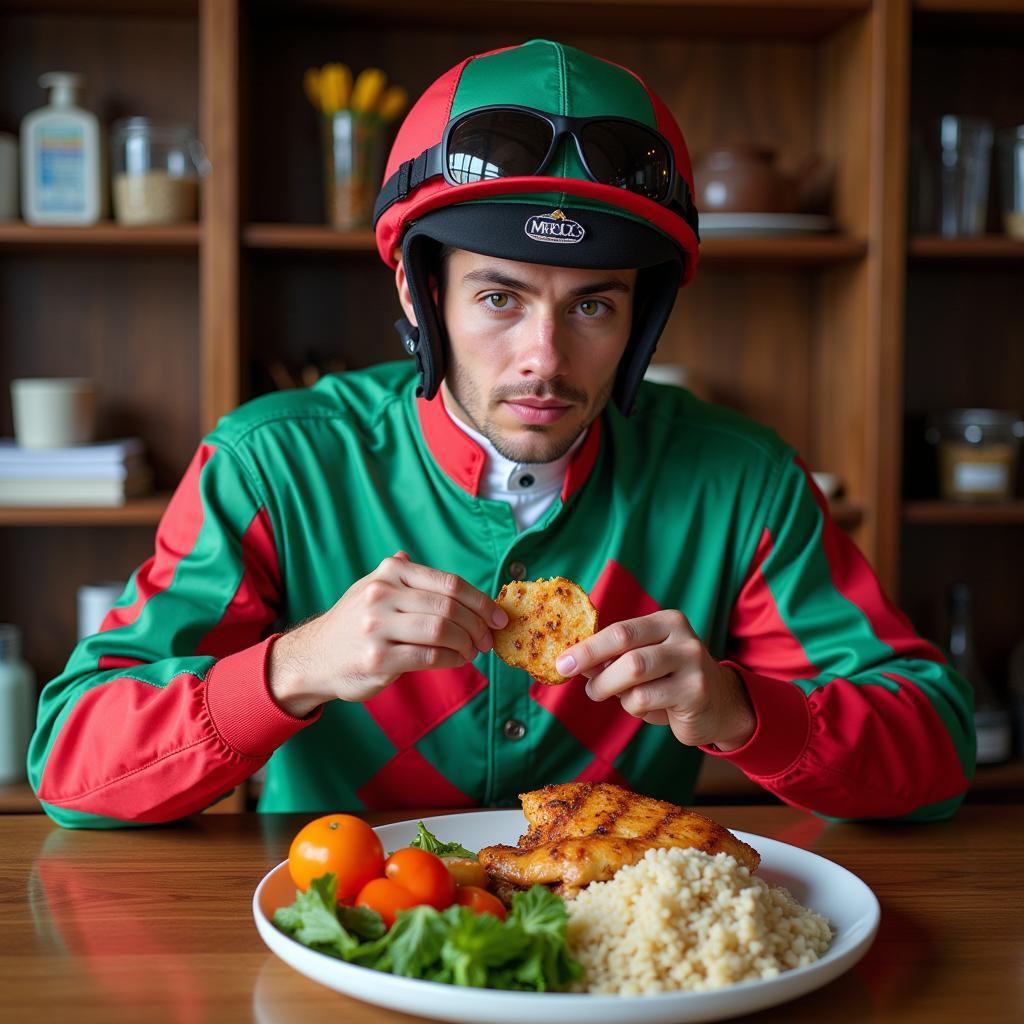A winning horse and jockey team requires more than just skill and training; proper nutrition plays a crucial role in achieving peak performance. This article dives into the specifics of a Horse And Jockey Food Menu, exploring the optimal dietary needs for both athlete and equine partner.
The Equine Athlete’s Diet: What’s on the Horse and Jockey Food Menu?
A horse’s diet is fundamental to its health, energy levels, and overall performance. Unlike a jockey’s menu, which can be more diverse, a horse’s diet revolves primarily around forage, grains, and supplements, carefully balanced to meet its specific needs. Just as a tailored horse and jockey food menu contributes to success, so does a customized equine diet.
Forage: The Foundation of a Healthy Horse Diet
Forage, including hay and pasture, should comprise the bulk of a horse’s diet. It provides essential fiber, promoting healthy digestion and preventing colic. High-quality hay, such as Timothy or Orchard grass, is crucial for maintaining optimal weight and providing sustained energy.
Grains: Energy Boost for Performance Horses
Grains like oats, corn, and barley provide readily available energy for working horses. The amount and type of grain in a horse and jockey food menu—specifically the horse’s portion—should be determined based on the horse’s workload and individual metabolic needs. Overfeeding grains can lead to digestive issues and obesity.
Supplements: Filling Nutritional Gaps
Supplements, like vitamins and minerals, can be added to a horse’s diet to address specific deficiencies and support overall health. Common supplements include electrolytes, joint support formulas, and biotin for hoof health. A veterinarian can help determine the appropriate supplements for a horse’s individual needs.
Fueling the Rider: The Jockey’s Side of the Horse and Jockey Food Menu
Jockeys must maintain a strict diet to meet demanding weight requirements while ensuring adequate energy for competition. Their horse and jockey food menu focuses on lean protein, complex carbohydrates, and healthy fats.
Lean Protein: Building and Repairing Muscle
Protein is essential for building and repairing muscle tissue, crucial for a jockey’s strength and endurance. Lean protein sources, such as chicken, fish, and eggs, are staples in a jockey’s diet.
Complex Carbohydrates: Sustained Energy for Races
Complex carbohydrates provide a slow-release source of energy, crucial for maintaining stamina throughout a race. Whole grains, fruits, and vegetables are excellent sources of complex carbohydrates.
Healthy Fats: Supporting Overall Health
Healthy fats, such as those found in avocados, nuts, and seeds, are essential for hormone production and overall well-being. They also contribute to satiety, helping jockeys manage hunger while maintaining a healthy weight.
 Jockey Consuming a Nutritious Meal
Jockey Consuming a Nutritious Meal
A Winning Combination: The Importance of a Balanced Horse and Jockey Food Menu
A well-planned horse and jockey food menu is essential for achieving optimal performance and maintaining the health and well-being of both athlete and equine partner. Just as a jockey needs a balanced diet, so does the horse. By prioritizing proper nutrition, both horse and jockey can reach their full potential.
Dr. Sarah Mitchell, Equine Nutritionist, states, “A balanced diet is the cornerstone of a successful equine athlete. Just like any athlete, a horse requires the right fuel to perform at its best.” Similarly, renowned Jockey Nutritionist, James Peterson, emphasizes, “Maintaining a healthy weight while fueling the body with essential nutrients is paramount for a jockey’s success.”
Conclusion
A strategically designed horse and jockey food menu is the key to maximizing performance and ensuring long-term health. By focusing on balanced nutrition for both horse and rider, we can unlock their full potential and pave the way for victory. A properly tailored horse and jockey food menu is an investment in success.
FAQ
- What is the most important component of a horse’s diet? Forage, such as hay and pasture.
- Why are grains important for performance horses? They provide readily available energy.
- What types of protein are best for jockeys? Lean protein sources like chicken and fish.
- How do complex carbohydrates benefit jockeys? They provide sustained energy.
- What is the role of supplements in a horse’s diet? They address nutritional deficiencies.
- Why is a balanced horse and jockey food menu important? For optimal performance and health.
- How can I learn more about creating a custom food menu? Consult with a veterinarian or equine nutritionist.
Need support? Contact us at Phone: 0772127271, Email: [email protected] or visit us at QGM2+WX2, Vị Trung, Vị Thuỷ, Hậu Giang, Việt Nam. We have a 24/7 customer support team.